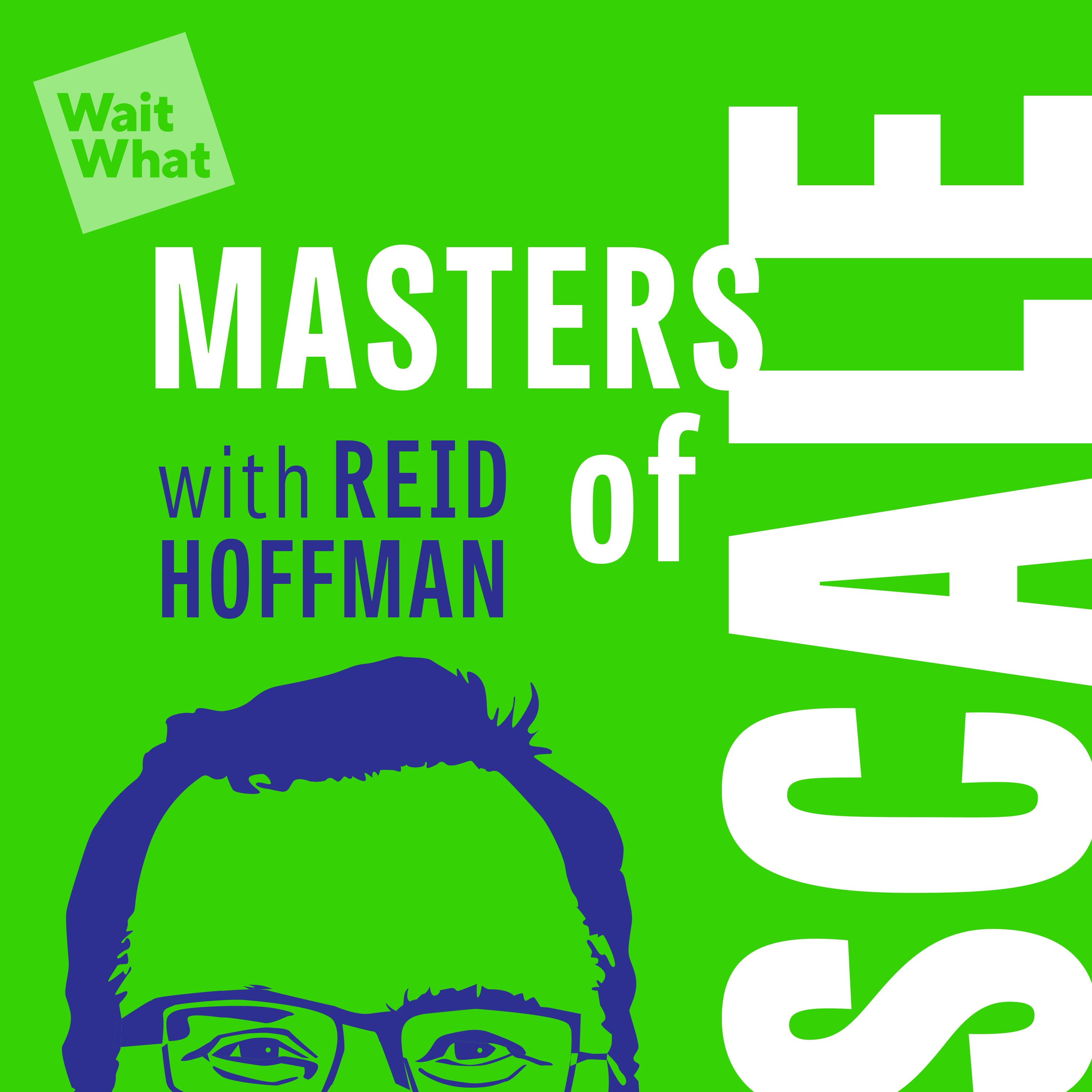
April 9, 2024 • 31min
The healthy, conscious capitalist, w/Whole Foods Market co-founder John Mackey
Masters of Scale

Key Takeaways
- Find your passion and purpose - John Mackey's journey with Whole Foods began when he discovered his passion for natural foods and health as a young "hippie" in Austin
- Catch the wave - Whole Foods capitalized on the growing trend towards organic and natural foods, even when others didn't see the potential
- Focus on quality over quantity - Whole Foods prioritized creating beautiful stores and great customer experiences rather than just competing on price
- Be patient with real estate - Whole Foods was selective about store locations, waiting for prime spots rather than rushing to open in suboptimal areas
- Create value for all stakeholders - Mackey believes in "conscious capitalism" that benefits customers, employees, suppliers, and communities, not just shareholders
- Be willing to make tough leadership decisions - Mackey had to ask his father to leave the board when their visions conflicted, a difficult but necessary move
- Stay open to unexpected opportunities - The Amazon acquisition came about unexpectedly but provided a solution to Whole Foods' challenges
- Have a higher purpose beyond profits - For Mackey, Whole Foods and his new venture Love.Life are about helping people live healthier lives
Introduction
John Mackey co-founded Whole Foods Market in 1980 and served as CEO for over 35 years, growing it from a single store in Austin to an international chain with over 500 locations. Under his leadership, Whole Foods played a major role in bringing organic and natural foods into the mainstream. The company was acquired by Amazon in 2017 for $13.7 billion. In this episode, Mackey shares the story of Whole Foods' growth and his philosophy of conscious capitalism.
Topics Discussed
Finding Purpose and Passion (05:37)
Mackey's journey began as an aimless college student in Austin seeking meaning and adventure. After an eye-opening LSD experience at age 22, he realized he wanted to find purpose, community and happiness. This led him to move into a vegetarian co-op where he discovered his passion for natural foods and health.
As Mackey explains: "I became a vegetarian. I learned how to cook. I got passionate about food and health, and that was sort of the genesis."
- An LSD trip and conversation with a philosophy professor sparked Mackey's search for meaning
- Living in a vegetarian co-op introduced him to natural foods and cooking
- Working at a small natural food store inspired the idea to open his own
Starting Safer Way Natural Foods (08:05)
With his girlfriend Renee Lawson Hardy, Mackey raised $45,000 from friends and family to open a small natural foods store called Safer Way in Austin in 1978. Despite losing money the first year, it was a valuable learning experience.
- Raised $45,000 to open first store, barely enough to get started
- Named it "Safer Way" as a pun on Safeway
- Lost over half their investment in the first year
- Realized they needed to get bigger to be competitive
Merging to Create Whole Foods Market (09:22)
Recognizing they needed to grow, Mackey approached one of their competitors about merging. This led to opening the first Whole Foods Market in 1980 in downtown Austin, which was an immediate success.
As Mackey recalls: "People ask me how long it took that first Whole Foods Market to be successful. I say until about 3:00 in the afternoon. On the first day it just exploded out of the gates. And within six months, we were the highest volume natural food store in the United States."
- Merged with a competitor to open larger store
- First Whole Foods Market opened in 1980 in Austin
- Was an immediate success, becoming highest volume natural foods store in US within 6 months
Overcoming Early Challenges (10:14)
Less than a year after opening, a major flood nearly destroyed the uninsured store. The company was saved by the support of employees, customers and the community - showing Mackey the importance of all stakeholders.
- Devastating flood caused 8 feet of water damage in uninsured store
- Employees worked for free to help reopen
- Community pitched in to clean up and save the business
- Showed Mackey the interdependence of all stakeholders
Capitalizing on Industry Trends (11:39)
As mainstream supermarkets focused on competing with Walmart on price by cutting costs, Whole Foods saw an opportunity to provide a better shopping experience with higher quality products.
- Mainstream grocers were cutting costs to compete with Walmart on price
- This made stores less attractive to shop in
- Whole Foods focused on beautiful stores and great service
- Many customers were willing to pay more for better experience and quality
Overcoming Investor Skepticism (12:03)
Early on, Whole Foods struggled to convince investors there was a large market for natural foods. But Mackey sensed a generational shift happening that would drive demand.
As he explains: "Venture capitalists didn't believe it. We got turned down again and again. I was told, 'You guys are a bunch of hippies selling food to other hippies, and we don't think that's a very big market.' What they didn't understand was the world was changing."
- VCs were skeptical of market size for natural foods
- Mackey saw a generational shift happening
- Focused on passionate customers willing to evangelize
- Confident natural foods market would continue growing
Making Tough Leadership Decisions (13:23)
As Whole Foods grew, Mackey faced conflicts with his father, who had been a key advisor and board member. Ultimately, Mackey had to ask his father to resign from the board to resolve their disagreements.
- Mackey's father was an early advisor and board member
- They began fighting over growth strategy and acquisitions
- Mackey asked his father to resign from the board
- Was the hardest business decision he had to make
- Marked a milestone in Mackey's leadership growth
Strategic Real Estate Approach (19:10)
A key to Whole Foods' successful scaling was its patient, selective approach to choosing store locations. Rather than rushing to open in suboptimal spots, they waited for prime real estate.
Mackey explains: "Patients and not forcing the growth, because this is one of the most important competitive advantages Whole Foods had. I watched all our competitors make bad decisions. They wanted to get the stores open, they took B locations and they paid the price for it, whereas we just held out for great locations."
- Prioritized demographics like education levels and income
- Focused on factors like parking, visibility, and ease of access
- Willing to delay entering markets until ideal locations available
- Gave Whole Foods competitive advantage over less patient rivals
Navigating Public Controversies (22:20)
As a public company CEO, Mackey faced several controversies, including backlash over an op-ed he wrote criticizing Obamacare. He learned the challenges of separating his personal views from the company's stance.
- 2009 Wall Street Journal op-ed criticizing Obamacare sparked major backlash
- Led to boycotts and calls for Mackey to be fired
- Taught him his views were seen as the company's views
- Learned to be more careful about public statements
Philosophy of Conscious Capitalism (23:16)
Mackey believes businesses can be a force for good by creating value for all stakeholders, not just shareholders. This philosophy is outlined in his book "Conscious Capitalism."
As he explains: "Business done in a conscious way, is creating value for all of these constituencies. Teachers educate, architects design buildings, engineers construct things, and yet they all make money. They're making money because they're creating value for other people."
- Businesses can create value for customers, employees, suppliers, communities
- Optimizing for all stakeholders leads to best long-term results
- Most entrepreneurs driven more by passion than just money
- Conscious capitalism can make business a force for good
Amazon Acquisition (25:24)
In 2017, facing pressure from activist investors, Mackey came up with the idea to sell to Amazon. The deal came together quickly after an initial meeting.
- Activist investors were pressuring Whole Foods to cut prices and sell
- Mackey saw Amazon as potential solution
- Deal came together in just 6 weeks after initial meeting
- Allowed Whole Foods to make needed changes without short-term stock pressure
Stepping Down as CEO (28:38)
In 2022 at age 69, Mackey decided to retire as CEO of Whole Foods. He ensured a smooth transition by giving a year's notice and fully handing over control.
- Gave one year notice before retiring at age 69
- Felt it was time for younger generation to take over
- Fully stepped back to allow new CEO to lead independently
- Wanted to pursue other interests and work less
New Venture: Love.Life (29:57)
Even before leaving Whole Foods, Mackey was planning his next venture - an integrated health and wellness company called Love.Life.
He describes the vision: "We're going to have a healthy food restaurant there. We're going to have a fitness center, a gym, we're going to have a spa. We're going to have all kinds of recovery modalities. We're going to have all kinds of alternative medical treatments from acupuncture, cupping, ayurvedic physical therapy, chiropractic."
- Integrated health and wellness centers
- Will include healthy restaurant, gym, spa, alternative treatments
- Aims to change paradigm around wellness and healthcare
- Driven by purpose of helping people be healthiest versions of themselves
Conclusion
John Mackey's journey with Whole Foods exemplifies how aligning passion and purpose with larger trends can lead to transformative business success. By focusing on quality, strategic growth, and creating value for all stakeholders, Whole Foods helped bring natural and organic foods into the mainstream. Mackey's philosophy of conscious capitalism shows how businesses can be a force for good while still achieving financial success. His new venture Love.Life demonstrates his ongoing commitment to improving people's health and wellbeing through innovative business models.




